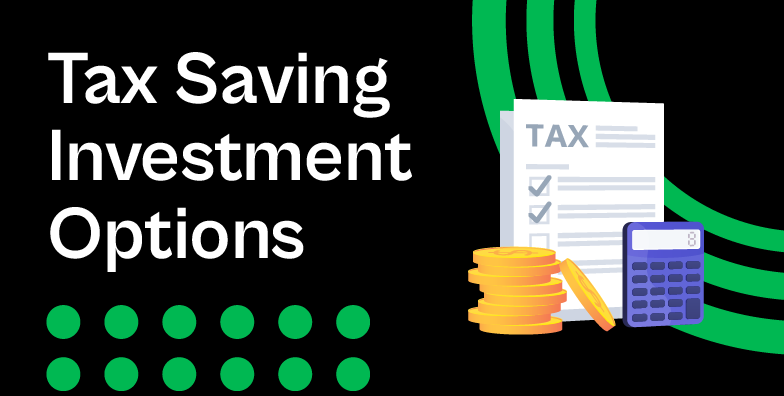
Tax-saving investment schemes help you lower your tax payable amount. They also help you grow your money to meet your financial goals.
Let us understand more about tax saving schemes.
List of Tax Saving Investments and Schemes in India
- Fixed Deposit: A fixed deposit offers fixed returns at the end of its tenure. These deposits with a minimum term of five years qualify for a tax deduction of up to ₹ 1.5 lakh per annum subject to conditions under Section 80C of The Income Tax Act, 1961. They are ideal for low-risk investors with a medium investment horizon.
- Mediclaim or Health Insurance: Health insurance or Mediclaim covers medical expenses related to an illness or an accident. These plans offer financial protection against hospitalisation and other health expenses. They also offer tax benefits under Section 80D of The Income Tax Act, of 1961. You can get a deduction up to ₹ 25,000/- under Section 80D for yourself and your family (₹ 50,000/- if the age of the insured is 60 years or above) and up to ₹ 25,000/- (₹ 50,000/- if the age of insured is 60 years or above) for your parents.
- National Savings Certificate: The National Savings Certificate is a fixed-income savings scheme backed by the Government of India. It is suited for small to middle-income groups. The scheme offers a tax deduction of up to ₹ 1.5 lakh per annum subject to conditions under Section 80C of the Income Tax Act, 1961.
- Pension Plans: Pension plans are tax-saving schemes designed to offer a fixed income during your retirement, for life. The premiums paid towards these plans are eligible for tax deduction of up to ₹ 1.5 lakh per annum subject to conditions under Section 80CCC of the Income Tax Act, 1961.
- ULIP: A Unit-Linked Insurance Plan is an insurance product that allows you to invest in various market-linked funds and grow your money for your financial goals. Additionally, it offers financial protection in case of an unfortunate event during the policy term. The premiums paid under the policy offer a tax[3]deduction of up to ₹ 1.5 lakh per annum subject to conditions under Section 80C of the Income Tax Act, 1961. Further, the proceeds received are exempt and subject to conditions under Section 10(10D) of the Income Tax Act, 1961.
- Endowment Plans: Endowment plans are insurance-based tax-saving schemes. They enable savings for long-term goals like your child’s education, buying a house, travelling and more. They offer fixed returns along with a life cover. Endowment plans are suitable for disciplined savings at low risk. The premiums paid under the policy are eligible for tax deductions of up to ₹ 1.5 lakh subject to conditions under Section 80C of the Income Tax Act, 1961. Further, the proceeds received are exempt and subject to conditions of Section 10(10D) of the Income Tax Act,1961.
- Term Insurance: Term insurance is a pure life insurance plan that offers financial protection against any unfortunate event during the policy term. Term insurance offers tax benefits under Sections 80C, 80D, and 10(10D) of the Income Tax Act, 1961.
The premium paid is eligible for a tax deduction of up to ₹ 1.5 lakh subject to conditions under Section 80C of the Income Tax Act, 1961. Premiums paid towards medical insurance riders offered by term plans qualify for tax benefits under Section 80D of the Income Tax Act, 1961. Lastly, the maturity benefit is exempt subject to certain conditions of Section 10(10D) of the Income Tax Act, 1961. - Tax-saving mutual fundsTax-saving mutual funds, known as Equity-Linked Savings Schemes or ELSS, are equity mutual funds that invest in equity-related instruments. These funds are suitable for investors with a medium to high-risk appetite. Investments made towards ELSS funds qualify for a tax deduction of up to ₹ 1.5 lakh subject to conditions under Section 80C of the Income Tax Act, 1961.
Post Office Tax Saving Schemes
List of the key post office schemes that qualify for tax deductions under Section 80C of the Income Tax Act, 1961 is as below:
- National Pension Scheme (NPS)The National Pension Scheme or NPS is a government-backed pension scheme for central and state government employees as well as private and unorganised sector employees. Employee’s contribution is eligible for tax deduction under sec 80 CCD (1) of the Income Tax Act up to 10% of salary (Basic + DA). This is within the overall ceiling of ₹ 1.50 lakh under Sec. 80 CCE of the Income Tax Act, 1961 You can claim an additional tax[3] deduction under Section 80CCD(1B) for contributions made to the NPS Tier I account up to ₹ 50,000. Employer’s contribution towards NPS Tier-I is also eligible for a tax[3] deduction under Section 80CCD(2) of the Income Tax Act, 1961. This is capped at 14% of the salary for central government employees and 10% of the salary for employees of other sectors.
- Public Provident Fund (PPF)The Public Provident Fund or PPF is a long-term investment scheme that offers fixed returns at maturity. PPF offers low risk and can be considered by employees of all sectors. The investment also offers a tax deduction of up to ₹ 1.5 lakh in a financial year subject to conditions under Section 80C of the Income Tax Act, 1961.
- Sukanya Samriddhi Yojana (SSY)SSY is a uniquely designed scheme that parents of a girl child can use to save for their daughter’s education or marriage. This is another low-risk savings option. The scheme offers a tax deduction of up to ₹ 1.5 lakh in a financial year subject to conditions under Section 80C of the Income Tax Act, 1961.
Conclusion
There are multiple options when one is looking for tax-saving schemes. Each of these options come with their own set of benefits and limitations. They are built to suit the needs of investors of varying ages and risk appetite. Investing in them can help you save taxes[3] and grow money for your financial goals.
Tax Saving Investments FAQs
1. How much investment is needed to save tax?
It is important to refer to the latest provisions of The Income Tax Act, 1961 to determine how much investment you must make to save taxes. Tax laws are subject to change, and the specific amount you need to invest in tax-saving schemes can depend on your age, income and the nature of your investments.
For example, you can claim a deduction of up to ₹ 1.5 lakh per annum on eligible investments under Section 80C. This includes tax-saving investments such as life insurance, Employee Provident Fund (EPF), Public Provident Fund (PPF), Equity-Linked Savings Schemes (ELSS), National Savings Certificate (NSC) and more. It also includes the principal payment amount on home loans, among others. Additionally, you can claim deductions for the premiums paid on health insurance policies bought for yourself, your spouse, children and parents subject to conditions prescribed under Section 80D.
It is advisable to consult a tax planner or financial advisor to understand the latest rules and make informed investment decisions.
2. Do I have to pay taxes on the investments?
Yes, you may have to pay taxes on the investments you make, depending on the type of investment and the gains you earn from them. For example, when you sell assets like stocks, real estate or mutual funds for a profit, you are liable to pay capital gains tax on the gains. There are two types of capital gains in India – Long-Term Capital Gains (LTCG) and Short-Term Capital Gains (STCG).
You may also have to pay advance tax on income from investments.
3. What is the maximum limit of investment under Section 80C?
You can claim deductions of up to ₹ 1.5 lakh per annum on eligible investments subject to conditions prescribed under Section 80C of The Income Tax Act, 1961.
4. Which investments come under Section 80C of the Income Tax Act?
Below is the illustrative list of tax saving options that come under Section 80C of The Income Tax Act, 1961:
- Equity-Linked Savings Schemes (ELSS)
- National Pension System (NPS) referred to in Section 80CCD
- Unit Linked Insurance Plans (ULIP)
- Investment in five-year Term Deposits and five-year Post Office time deposit
- Public Provident Fund (PPF)
- Senior Citizen Savings Scheme (SCSS)
- National Savings Certificate (NSC)
- Sukanya Samriddhi Yojana (SSY)
- Premiums paid towards life insurance policies
- National Bank for Agriculture and Rural Development (NABARD) Rural Bonds
- Employee Provident Fund (EPF)
- Principal Repayment Made Towards Home Loan, stamp duty and registration charges
5. What are the penalties for premature withdrawal of tax-saving investments?
Penalties for premature withdrawal of income tax saving schemes can vary depending on the specific investment instrument. For example, you cannot withdraw funds from tax-saving FDs within a lock-in period of five years from the date of the investment. So, you must understand the different withdrawal rules for each tax-saving scheme before investing.
Financial and Business expert having 30+ Years of vast experience in running successful businesses and managing finance.





